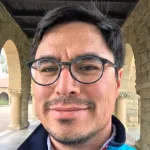
Dr. José Dinneny received his BS from UC Berkeley in Plant Biology and Genetics in the Department of Plant and Microbial Biology and PhD from UC San Diego working with Detlef Weigel at the Salk Institute for Biological Science and Martin Yanofsky in the Division of Biology, UCSD. His work focused on the cloning and characterization of JAGGED and NUBBIN in flower and fruit development. He then went to Duke University to do his post-doctoral studies with Philip Benfey. There he utilized Fluorescence Activated Cell Sorting (FACS) to develop the first tissue-specific map of transcriptional changes occurring during abiotic stress. Dr. Dinneny established his independent lab at the Temasek Lifesciences Laboratory (TLL) in Singapore with a joint appointment at the National University of Singapore, Department of Biological Sciences. He was an inaugural fellow of the National Research Foundation, Singapore. Dr. Dinneny moved his lab in 2011 to the Carnegie Institution for Science, Department of Plant Biology. In 2018, Dr. Dinneny joined the faculty at Stanford University in the Biology Department as an Associate Professor. In the Biology Department, he serves as Director of Graduate Studies and chair of the Graduate Studies Committee.
He is an HHMI-Simons Faculty Scholar and was a National Research Foundation of Singapore fellow, an NIH Ruth Kirschstein post-doctoral fellow and an HHMI predoctoral fellow. He was recognized in 2017 by Science News magazine’s 2017 SN 10: Scientists to Watch list.
In the next 50 years, one of the greatest advances we can make for global human health is the realization of a society that is fully sustainable. Dr. Dinneny's research aims to improve agricultural sustainability by using a holistic approach that integrates across genetic, cellular and organismal scales to understand how plants survive stressful environments. Prior research has explored water-stress responses at unparalleled spatial and temporal resolution, and identified the endodermal tissue layer as a critical signaling center for controlling growth and tissue differentiation in roots, the discovery of novel adaptive mechanisms used by roots to capture water established potential targets for breeding to improve water use efficiency, the invention of imaging methods enabled multidimensional studies of plant acclimation and illuminated our understanding of organ system growth from germination to senescence, physiological and molecular insight has been gained in understanding how plants sense water availability through computational modeling of tissue hydraulics, and fine-scale biomechanical measurements identified a novel mechanism by which salinity damages cells through its effects on cell-wall integrity. Dr. Dinneny has paired his research with a personal passion for improving the education of young plant scientists, engaging lawmakers through science policy, and by being a vocal advocate for the broad deployment of agricultural biotechnology.